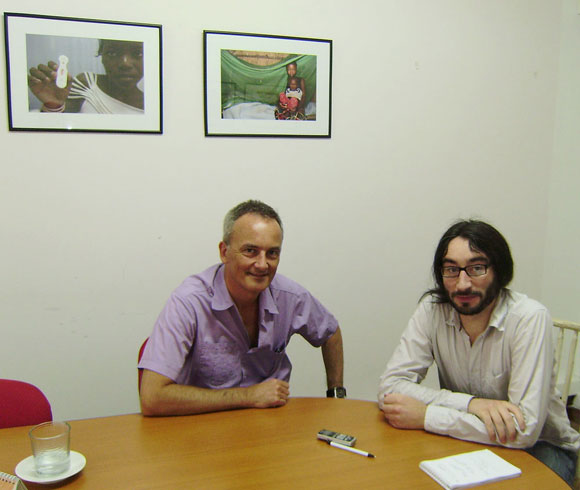After months without returning to my old neighbourhood, this August bank holiday Monday found me two doors away from the house I first lived in when I moved to Maputo, for another meeting at the Malaria Consortium office. However this time I had been invited to meet David Ralph, one of the finalists in the Guardian International Development Journalism Competition. I have posted a picture of myself and David – note the pictures of bed nets for malaria prevention in the background!
The Malaria Consortium is one of a group of Non Government Organisations who are working with the Guardian newspaper in order to stimulate writing and interest in development issues. The competition has encouraged both professional and amateur journalists to write about a huge range of themes which really help capture some of the challenges facing countries as they strive to develop economically.
There are 16 finalists, eight professional and eight amateur journalists, on a longlist for the prize and each is writing a further article for the next stage of the competition. David is one of the amateur finalists and the article that got him to this stage of the competition, along with those of the other finalists, can be found here.

This competition is a great and important idea for improving knowledge and understanding of development issues. As individuals the images we have of development can vary hugely. A predominant idea of development is of countries in crisis, either through conflict or natural disasters. So increasing understanding of some of the more mundane realities of development, such as the challenges of ensuring people in remote villages have access to basic services like health and education, is useful to deepen understanding of some of the building blocks needed for effective development.
David is doing background work for an article on community health workers (CHWs), who are members of the community who have had some training on health and are engaged in prevention, and sometimes treatment, activities in order to extend the reach of health services. Whilst CHWs have been described as the solution of Africa’s health problems, the reality is that there are no simple solutions. Whilst CHWs can be very effective at certain tasks they are just one potentially important component of a health service.
Normally when I am looking to establish the evidence base for a particular intervention in health to decide whether it represents value for money, I look first to the Cochrane Collaboration, a website for contributors to house reviews of healthcare interventions, to see if there has been a systematic review of the available evidence. I have attached a link to a Cochrane review of CHWs – which highlights a number of areas where CHWs may make a difference.
But to find out David’s assessment of the role of community health workers, we will have to wait until the final of the competition. The winners of the competition will be announced on 11 November, with the professional journalist’s articles appearing in the paper on Saturday 13 November and the amateur journalist’s articles on Monday 15 November. I for one look forward to reading all the entries.


Recent Comments